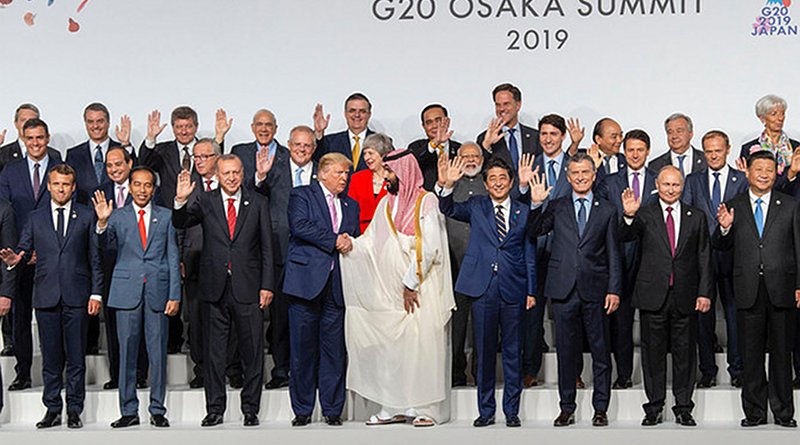A Climate Change Window At Saudi-Hosted G20 – OpEd
By Arab News
By Andrew Hammond*
The heightened tension in the Middle East has become a key early test for the 2020 Saudi-hosted G20, with Riyadh urging de-escalation. Yet this year’s G20, the first ever hosted by an Arab state, has the potential to be memorable for a quite different reason: A breakthrough on the climate agenda.
One of the key themes of the Saudi presidency of the G20, in the fifth anniversary of the 2015 Paris climate change agreement, is safeguarding the planet by fostering collective efforts.
Tackling global warming is central to this agenda, and the G20 leadership meeting in November starts immediately after the annual UN Climate Summit finishes in Glasgow, at which there is already significant pressure to make major progress on implementing the Paris commitments.
Indeed, the two-week summit in Glasgow is being billed as the most important climate gathering since 2015, with some 200 world leaders attending. The event, held just after the US presidential election, is therefore a potential crossroads in the battle against global warming, and a test of the diplomatic mettle of UK Prime Minister Boris Johnson’s government.
It is in this context that environmental themes will potentially be key to this year’s G20, and given current escalated concern over climate change, this year’s summitry could become the most significant since the UK-hosted 2009 leaders meeting in London during the storm of the international financial crisis.
Since then, when then-French President Nicolas Sarkozy claimed that “the G20 foreshadows the planetary governance of the 21st century,” the body is perceived by some to have seized the mantle from the G7 as the premier forum for international economic cooperation and global economic governance.
The reason why the G20 has so much potential influence is that it is comprised of the powers accounting for some 90 percent of global gross domestic product, 80 percent of world trade and around 66 percent of the global population. Those powers are the US, China, Germany, India, Japan, Indonesia, Australia, Russia, Brazil, the UK, Saudi Arabia, South Africa, Turkey, France, Italy, Germany, Canada, South Korea, Argentina, Mexico and the EU.
Yet the forum has failed so far to realize the full scale of the ambition that some like Sarkozy thrust upon it. So a major win in 2020 on the climate front, achieved in combination with the UN Summit in Glasgow, is a key opportunity for Saudi Arabia and the UK.
This is especially so as some recent G20 meetings have been perhaps most memorable for the group’s divisions, including over climate change, with US President Donald Trump isolated 19-1 on the issue in Hamburg in 2017.
With Trump in power until at least 2021, one of the key tasks of the G20 and the UN Climate Summit will be seeking to bring him into, or neutralize his opposition to, any bold new action on climate change. While this will be difficult, 2019 saw a massive awakening of concern about global warming issues.
While Saudi Arabia has been criticized by some for its own climate change record, data released by the International Energy Agency in December showed that the Kingdom lowered its emissions in 2018 by 15 million tons of carbon dioxide (or by 2.7 percent).
That is the fourth-fastest fall in emissions among G20 countries, behind Mexico, Germany and France. This is potentially important as it is Saudi Arabia’s first significant policy-induced reduction in carbon emissions.
The reason why it is so important to act in the 2020 window of opportunity that now exists is the high risk that under current emissions trajectories and Paris pledges, global warming will exceed 1.5 degrees Celsius above pre-industrial levels, the level beyond which threatens runaway climate change.
The roadmap for moving forward in 2020 is clear. Firstly, implementation of the Paris deal will be most effective through national laws, where politically feasible. Country commitments put forward in 2015 will be most credible and durable if backed up by legislation.
In the US, part of the reason Trump could unravel Paris ratification so relatively straightforwardly is that it was politically impossible to get the treaty approved in Congress. Former President Barack Obama therefore embedded the agreement through executive order, before Trump set his own executive actions reversing his predecessor’s order.
While the pledges made for Paris are not yet enough, the treaty has crucially put in place the domestic legal frameworks that are crucial building blocks to measure, report, verify and manage greenhouse gas emissions.
Specifically, countries are required under the agreement to report on emissions and their progress in reaching the goals in their national plans submitted to the UN, and update them every five years, including in Glasgow. In the future, these frameworks must be replicated in even more countries, and progressively ratcheted up.
Taken together, this year’s G20 can therefore help co-create and implement what could be part of a foundation of global sustainable development for billions. This starts with speedy, comprehensive implementation of Paris, while showing even greater ambition on the climate fronts as we move into the 2020s.
- Andrew Hammond is an associate at LSE IDEAS at the London School of Economics.

